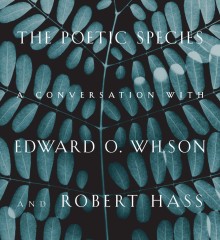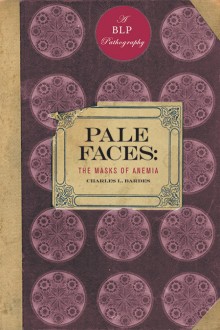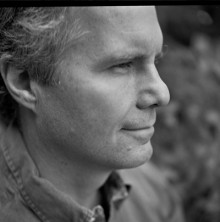Welcome to the BLP Conversations series, featuring dialogues between people whose lifework, like BLP’s mission, explores the creative territory at the intersection of the arts and sciences, and has become a testament to how science and the humanities can join forces to educate and inspire. This online series is inspired by E.O. Wilson and Robert Hass, whose talk about the connections between science and the arts was published in our book The Poetic Species: A Conversation with Edward O. Wilson and Robert Hass.
In this conversation, Charles L. Bardes, physician and author of Pale Faces: The Masks of Anemia (from the BLP Pathographies series), and critically acclaimed poet Tom Sleigh explore the way myths influenced their psyches, and how the narratives of the gods were transposed onto classrooms and football games and suburban neighborhoods in their early writerly minds.
Charles L. Bardes: You recently asked me, how did ancient myths enter our childhoods?
I think myth offered a way of thinking about things that I otherwise couldn’t conceive. A boy read how Kronos devoured his children, who yet were unharmed and later disgorged as young and conquering gods; how Apollo sought Daphne, and maybe she him, in some incomprehensible mix of pursuit and tenderness; how the infant Herakles strangled a snake; how the whole cosmos seemed rightly ordered and endeavored after something and was sad.
Zeus and Apollo and gray-eyed Athena and goat-footed Pan felt more real to me than the other candidate deities offered on Sundays. The myths enacted the moments when mortals touched the divine.
Tom Sleigh: I spent part of my growing up in a tiny town high in the mountains in Utah. When I was in first grade, my mother gave me D’Aulaires’ Book of Greek Myths, and I’ll never forget the picture of Kronos devouring his children. He had one of them clutched like a Popsicle stick in his fist, his mouth opening to bite off the child’s head. It was all graphically real, heightened from life, of course, but thoroughly recognizable as paradigmatically parental. The look on Kronos’s face was part disgust, part this-is-going-to-hurt-me-worse-than-it’s-going-to-hurt-you, a phrase that chimed with what my mother said on one of the very few occasions when I was spanked by my father—not a serious spanking, just a few whacks that I curtailed by immediately bursting into a flood of desperately squeezed out tears and operatic wailing.
And at school, Kronos seemed like the incarnation of my math teacher, Mr. Capener, a giant, florid man—slow speaking, terminally polite, immensely patient with us, unless he caught us messing around. But none of us did mess around, because Billy Gallegos, a fearless, chubby boy who had the moral strength of the old martyrs, did it for us. Mr. Capener always called us by our formal Christian names. He would say, with great deliberation and gravitas, “Now William, William, please pay attention.” And when Billy would continue to grab-ass around, Mr. Capener’s face would flush a shade darker, the color rising in his cheeks like mercury in a thermometer. His big square jaw would work up and down, his eyes would almost cross, and then he’d take Billy, class clown and rebel, by the collar and throw him against the wall—an event that sometimes happened once or twice a class.
The rest of us, meanwhile, hunkered down at our desks, titillated by the violence, but feeling something like that moment in the movie Casablanca when Victor Laszlo stands up and tells the band in Rick’s nightclub, “Play the Marseillaise, play it!”—and all the patrons begin to sing it at the top of their lungs, drowning out the SS singing “Die Wacht am Rhein.”
Of course, Mr. Capener was nothing like a Nazi—a model teacher in most ways—and we certainly weren’t like Victor Laszlo. But we cheered on Billy’s rebellion in our coward hearts, while sitting silent and numb, clutching our pencils. I remember feeling exalted by the way Billy always got up laughing, which I suppose is why Laszlo comes to mind. Billy was an image of the unbowed spirit, Prometheus nailed to the cliff while the vultures ate his liver. So this bizarre combination of school day routine and wildly fluctuating emotion could be laid out against the grid of the myths.
It’s just as you say, Chuck: the image of Mr. Capener superimposed on Kronos made sense of what would otherwise have been inconceivable.
Certainly Jesus and God, and the whole theology of turning the cheek, forgiveness, and redemption, made no sense to the playground ethos of boys tackling each other all recess, playing a version of tag in which one boy with a football ran away from us while we chased him, tackled him, piled on with glee, and wrestled the football away—and then another one of us took off running, scapegoat, sacrificial victim, doomed but heroic god.
Since my town was a deer-hunting town, and since we often saw deer strapped to the bumpers of our neighbors’ vehicles during deer season, the story of Actaeon also made a perverse kind of sense.
Actaeon is out hunting with his dogs when he comes across Diana, virgin goddess of the hunt, bathing naked, and watches her from behind some bushes. One of Diana’s attendants sees him, and calls out to the goddess. Before Actaeon quite understands what’s happening to him, he feels his nose thickening into a muzzle, fur sprouting all over his body, a pair of antlers sprouting from behind his ears, his hands and feet narrowing and sharpening into the hooves of a stag. In the before and after picture in d’Aulaire, I remember Actaeon crouched behind some bushes, stealing a peek at the naked goddess, his three-quarter profile looking a little squeamish; and then on the facing page, that squeamish look giving way to rolling-eyed terror when his faithful dogs begin to chase after him. Racing through the underbrush, Actaeon, in his half-human half-animal heart, feels first-hand the terror of those deer strung up by their hooves and dripping blood from a knife slash in their throats before they were skinned out and gutted by a guy like Nick Topick—an otherwise mild-mannered insurance agent whom we terrorized with hurled spitballs on a town school bus that transported for free any town kid who could squeeze a dollar out of his parents for a rope-tow pass up at Beaver Mountain.
Actaeon, of course, gets dragged down by his own dogs and eaten. I confess, I always thought that Actaeon had it coming, that the deer in Nick Topick’s backyard had finally taken revenge. I entirely missed the point of Diana, the virgin goddess, being defiled by human eyes and desires—but I was a tamped-down kid in those days, and kept my sexual desires well below the horizon line. Nonetheless, the reversal of fate at the core of the myth made complete sense to me: just like the cartoons of the deer dressed up in red hunting vests, and carrying rifles, strapping a human to the bumper of their pick-ups.
Kronos and Mr. Capener and Billy, Diana and Actaeon and Nick, once they entered the myth’s force field, all that was inchoate and contradictory in daily life snapped into a pattern—just the way a magnet placed under a sheet of construction paper could drive into a pile of iron filings the petal shape of a rose.
CB: Some very powerful crosslinks:
D’Aulaires’ was the book for me, too. I must have read it a thousand times, and their versions of the stories are the ones that ring true even today, despite subsequent scholarly overwashes.
I think you’re misremembering the illustration of Kronos. In d’Aulaire, the swallowed divine children nestle safely in his abdomen, rendered as a transparent shell. The version you cite is Goya’s, a deformed ogre chewing the head off a limp and quite dead full-grown man. Interesting, too, that we both turn from myth to our neighborhoods’ particular forms of football, as if we intuited even then the alternating layers of innocence and violence, of boyish enthusiasm and aggression, the stylization, like a bullfight, like the slaying of the Minotaur.
Acteon came to figure the poet for me, or at least a type of poet, torn to pieces by his hunt’s own dogs.
TS: Of course you’re right about Goya and d’Aulaire—that I should confuse the two says a lot about me, as well as my childhood!
Your parallel between Orpheus, torn to pieces by the Maenads, and Actaeon, torn to pieces by his own dogs, make interesting overlays onto a pack of boys chasing each other down. As a kid, I played Pop Warner football, and the fantasies of glory I had as an offensive tackle and a defensive back (a strange combination, I admit, but I liked to run into other kids, and to tackle them in the open field) made me think of myself as almost superhuman: if we needed a touchdown, and the quarterback was desperate for yardage, I’d say, Four man four hole—the “four man” meant Danny the full back hit my hole after I’d cleared away the right tackle, and our tight end had body-blocked the linebacker. That was how confident I was that I could open a hole. I remember being in an exalted state of controlled rage for the entire game—a hyperaware state during which, for much of the game, I floated outside my body, watching myself execute my blocks or, because I was taller than most of the receivers, leaping up to knock down the wobbly passes the opposing quarterback would throw. The strength of the gods in d’Aulaire was an analogue to my own sense of invincibility.
If you change the terms to the poet pursuing language, then the dynamics of the chase—of charging into the resistances of your own psychic processes, of trying to swerve around impeding ghosts and half-intuited taboos, while seeing in language itself an almost supernatural release—become infinitely more complex. When Orpheus has his head torn off by the Maenads, his mouth keeps on singing as the severed head floats down the Hebrus River to the sea. He’s both dead, alive, and something in between: dismemberment becomes a typology for complete psychic destruction, for the shadow life of cultural memory, as well as divine inspiration. And when you think of Actaeon torn to pieces by his dogs, the knowledge Actaeon gains in his last moments of consciousness—what would that feel like? The awful, self-alienated sense of your humanity turning animal, something like David Cronenberg’s remake of The Fly, in which the main character through a botched scientific experiment becomes a species never known before, part fly, part human? Or more like the Island of Doctor Moreau, but this time making what is animal turn human, so that the tormented animal-humans chant to themselves, Are we not men? as they try to hold on to their newly acquired self-awareness?
Or did Actaeon simply continue to be human, though in a stag’s body? In that case, would he have felt some form of wonder at his change, like Bottom turned to an ass in Midsummer Night’s Dream? And, unlike Bottom, maybe a form of inchoate guilt for having spied on a “bare naked lady,” as we would have put it back in those days—as if he realized he’d trespassed beyond what’s human? Would he have felt the poetic justice in the hunter becoming the hunted? And if he’d realized all of these possibilities, wouldn’t that realization have about it the promise of some ultimate clarification? Unless what he felt was simply the clarification of being reduced to animal terror.
Would it be too much to say that the myths of both Orpheus and Actaeon function as cautionary, as well as exemplary, tales? Cautionary because messing about through language with your own psychic processes may have unexpected, even frightening outcomes. Exemplary because Orpheus, and even Actaeon, become part of a divine order that’s beyond anything human in its completeness.
And yet that form of poetic realization literally costs Orpheus and Actaeon their lives.
But it’s a little silly to talk about Orpheus and Actaeon as if they were real people. They’re like people you meet in nightmares; they aren’t in the least like the kid who fancies himself tougher than any other kid, and has to prove it to himself game after game. That’s the difference between myth and the ordinary life of writing poems. You nerve yourself up to write, but poems collaborate with you according to rhythms you can’t predict, and the rest of the time you feel uneasy: for not reading enough, or drinking too much caffeine, or thinking that you’re normal solitary routine may signal what a failure you are to not live up to the myths. After all, you can keep on being torn to pieces in your poems, and never lose a drop of blood.
But maybe the dirty secret of writing poems is that they aren’t written out of, or to add to, what Larkin dismissively called “the myth kitty.” Maybe they’re written out of an elated sense of unfolding possibility—as if you were a defensive cornerback and had just intercepted a pass so that everyone racing downfield begins to race after you upfield.
And unlike the myth, in which everything is foreknown, if not by you, then by the myth kitty, maybe you’ll make it across the goal line and maybe you won’t.
CB: I grew up in a newly constructed neighborhood of small houses on quarter-acre lots. Most families had bought their homes with GI-financed mortgages, and most had young kids. We adapted our games to the configuration of lawns and streets, so that baseball was played on a tar-and-gravel cul-de-sac, the pitcher’s mound a manhole cover, and football in the one backyard not obstructed by trees. We played the ordinary football on teams, except that every play was a pass, unless the defensive team rushed after the mandatory count of one-Philadelphia, two-Philadelphia,… five-Philadelphia; but our proud invention was Suiciditis. No teams: one against all. A boy carried the football towards a goal line until he was tackled by the others, requiring him to fumble the ball, to be picked up by another boy who ran it towards the opposite goal until he too was tackled and obliged to drop the ball, and so on for hours. On very hot days, we played the deliberately down-paced version called Slow-Motion Fumbilitis. We played on the lawns best suited to the game, regardless of whether the homeowner’s children participated, considering the entire neighborhood our communal property.
Whoever stepped in dog droppings, as happened often, was taboo for a few minutes or hours, depending on his momentary stature and the gang’s consensus.
Interesting to me now that our favorite game was one-against-all, rather than a team sport. You allude to this, too, in your memories—or fantasies—of saving the day on the football field, and I think we boys were imagining ourselves heroes, in the mythologic sense. The hero is typically a soloist, not a member of the ensemble—hence the rage of Achilles, when he finds he’s considered just one of the guys. We know a lot about Odysseus but hardly anything about his shipmates, except when they’re devoured or destroyed. Theseus, Oedipus, Herakles, Asklepios—all soloists. The Argonauts seem an exception, except that this was a boatload of soloist heroes, Jason included, which may explain why the voyage ended badly.
The poets, too, were one-against-all, or one-apart-from-all. Orpheus, in his earliest versions, was an underworld god, like Hades or Persephone. The later Greeks pulled him upwards into daylight and made him a god of song. But underworld traces always clung to him, as they did to Persephone, like cobwebs on a man emerging from a cave, and maybe this was why his songs moved beasts and stones, and maybe why the mob tore him apart when he could not love them enough.
You speak of an “exalted state of controlled rage,” and the switch from exultation to uncontrol can occur almost instantaneously. I think here of the William Carlos Williams poem about a baseball game, in which the crowd’s unity and excitement flips into a pogrom.
Orpheus was one of the heroes on the Argo. His lyre kept the beat for the oarsmen, a mythic coxswain.
Orpheus too was a healing deity, penetrating the boundary between the lower and upper worlds. Physicians sometimes imagine themselves heroes in the hot-dogging sense, but if there is any real heroism it consists of the descent to the underworld, staring at disease-demons and trying to bat them away as they pluck and tear at his sleeves and flesh. I think here of the temptation of Saint Anthony, as depicted by Schongauer or Grünewald, or of Dürer’s Knight, Death and the Devil.
The Akteon poet is Ezra Pound, also Baudelaire, Rimbaud, Villon—maybe Ovid, if we knew him better, exiled to nowhere for his carmen et error. Their fleeting vision of the goddess, intact, naked with her nymphs; their destruction.
Mulberry Lane was surrounded, then, on three sides by woods. They were my favorite places. I did not stumble on gods and goddesses there, but it made perfect sense to me when I later learned that trees and streams could be the homes or bodies of deities, dryads and oreads and naiads and—as I later learned—the maenads who were to dismember Orpheus.
TS: I had a grove, not exactly sacred, but casually mysterious, sort of like your Mulberry Lane. It was the cherry orchard out behind our house that was crisscrossed by irrigation ditches. The water came from a central culvert twice a week, and my neighbor who owned the orchard would pull out the sluice board to water different sections. I remember loving to walk through the orchard when the water was flowing, both because of the sound of the water flowing among the trees, little pleasant gurglings and gluggings and splashing sounds surrounding me as I took a stick and knocked the heads off weeds, and because of the sudden coolness that you could feel rising off the water and up into the heat shimmering among the leaves. The water would creep down the ditches, spreading ditch to ditch, until the whole orchard seemed to be lit from underneath, the water reflecting the light up against the undersides of the leaves that reflected it back down again.
Interesting that I should remember this moment, a “one-apart-from all” moment—a Huck Finn, rather than a Tom Sawyer, moment. Our pick-up baseball games would have been the Sawyer side of things: we argued as much as we played, the rules changed once an hour, and games would suddenly break up when somebody got called home.
Huck Finn is like a demotic Orpheus whenever he thinks about the river.
But I suppose Tom Sawyer is part of Orpheus, too: the hubris to think that he can go down to the underworld and sing his way back, Eurydice following at his heels.
CB: To end, for now:
this July night recalls trying
to sleep on hot humored nights sent
timely to bed before darkness
hearing slightly older boys
shout in the last sunlit minutes
playing stickball
I could not say
that we who built forts, rode
bikes, wrestled, clumsily swore
and sported, our favorite our own
football invention called fumble-itis,
later suiciditis, were less real than books,
but terror
was the pirate in Treasure Island
climbing the ratline clenching a knife, and
the Wingèd Monkeys, and the wolf,
and the sea-beast, and the ravens
who feast on the eyes of the slain knight,
and Abraham ready to slay his boy,
a chubby stripling not yet muscled
And I try to imprint
my mother reading us bedtime stories
whose mistakes, vanities, goofs, deceits,
schemes, malapropisms and pratfalls
laughed me speechless and silly, when
errors were easily remedied, quickly forgiven,
all the village feasting and laughing and dancing
in the last pages of Stone Soup before
the three clever soldiers went to bed
Charles L. Bardes, MD, is a practicing physician who teaches extensively at Weill Cornell Medical College, where he directs the Medicine Clerkship and serves as Associate Dean. He is the author of Essential Skills in Clinical Medicine, a guide for students and interns, and Pale Faces: The Masks of Anemia, the first book in the Bellevue Literary Press Pathographies series. He has been the Bernard DeVoto Fellow in Nonfiction at the Bread Loaf Writers’ Conference and his essays have appeared in numerous journals, including Agni. He lives in New York.
Tom Sleigh is the author of eight books of poetry, including Army Cats, winner of the John Updike Award from the American Academy of Arts and Letters, and Space Walk, which won the $100,000 Kingsley Tufts Award. He has also received the Shelley Prize from the Poetry Society of America and an Academy Award from the American Academy of Arts and Letters. His new book, Station Zed, is forthcoming from Graywolf Press in 2015. He teaches in the MFA Program at Hunter College and lives in Brooklyn, New York.
Up next in the BLP Conversations series: Tim Horvath, author of the New Hampshire Literary Award-winning short fiction collection Understories, discusses the evolutionary science behind language and reading with Mark Changizi, a theoretical cognitive scientist and author of Harnessed: How Language and Music Mimicked Nature and Transformed Ape to Man. (May 8, 2014)





